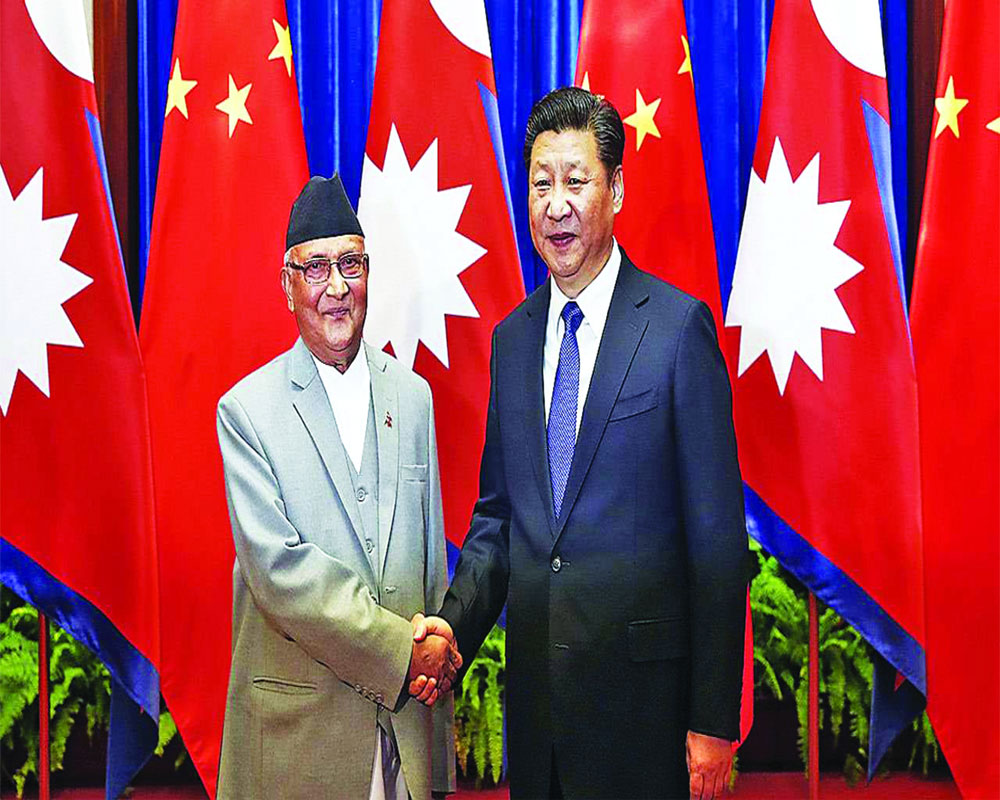Though Beijing has failed to facilitate a truce between the warring factions of the Nepal Communist Party, China would like Oli to remain in power
The dissolution of the Lower House of the Nepalese Parliament has caused looming political instability in the Himalayan nation. Prime Minister KP Oli continues to assert his position in the Nepal Communist Party as the “legitimate” chairperson after the Election Commission ruled in his favour and revoked his suspension by the Prachanda and Madhav Kumar Nepal-led faction last week. The onus now rests on the Supreme Court to decide on the legitimacy of the House’s dissolution and holding of fresh elections in March or April. Meanwhile, it is unlikely that the court will rule against Oli, considering his record with the court and the favours given in judicial appointments.
At stake for China: While the lingering uncertainty has led to political upheaval, Nepal is being closely monitored by India and China. India has officially communicated it as an “internal matter” of Nepal, but China has rushed to control the damage. The arrival of Guo Yezhou, a Vice-Minister of the International Department of the Chinese Communist Party (CCP), in Nepal was a clear indication of the Chinese holding their breath. But Beijing failed to facilitate a truce despite the fact that the delegation made headlines in the political and strategic sphere of Nepal. With an unsuccessful attempt to unite the warring factions of the Nepal Communist Party (NCP), China has the following issues at stake.
Political leverage: Politically, the CCP has established ties with the NCP. The CCP recommends to the Chinese Government the degree of economic and defence assistance to Nepal, making it the primary connection between the two Governments. The CCP and the NCP had formalised political ties during Chinese President Xi Jinping’s visit to Kathmandu in October 2019. The party allegedly provides political funding to the NCP through “humanitarian channels” like the Madan Bhandari Foundation. With the NCP now divided, the CCP will have to re-establish ground for political leverage in Nepal.
Economic calculations: China accounts for more than 60 per cent of the total FDI in Nepal. Until 2014, India had the largest FDI share in Nepal but following the then friendly Communist Government in Nepal, China managed to surpass India. In the past three years, China has tripled its investment in the hospitality, tourism, cement manufacturing and construction sectors. Popular tourist destinations like Thamel in Kathmandu are primarily leased by Chinese businessmen, who have been accused of sheltering Chinese nationals involved in scams, trafficking and bank fraud in Nepal. With the CCP-NCP nexus in place, diplomatic immunity has become the synonym of Chinese interests in Nepal.
Strategic Beijing: China’s immediate strategic stakes rest with the Belt and Road Initiative (BRI), military ties and an extradition treaty. Beijing has more than 10 BRI projects running in Nepal, and a non-Oli Government may cost big dimes to Beijing. Also, the People’s Liberation Army was planning the third edition of the Sagarmatha Military Exercise by 2020 end with Nepal Army, which began in 2017. Beijing projects the joint military exercise as a counter to India’s traditional security ties with Nepal. However, the House dissolution leaves little space for China to get the Nepal Army along for the exercise.
Beijing also expects an early conclusion of its extradition treaty with Nepal. During Jinping’s October 2019 visit, the treaty was almost signed but human rights advocates vehemently opposed the move. Amid the protests, the treaty was replaced by the Mutual Legal Assistance on Criminal Matters Treaty, similar to extradition. An extradition treaty will enable China to prosecute anti-China and free-Tibet voices in Nepal as it is home to 20,000 Tibetan refugees.
Lost traditional space: Traditionally, the United States (US) has followed India’s course of action concerning peace and security in Nepal. The two hold a similar position on protecting the rights of Tibetan refugees in Nepal, which irks Beijing. To appease the Chinese, Oli has stepped back from earlier commitments to join the Millennium Challenge Corporation (MCC) — an innovative and independent US foreign assistance agency to help fight global poverty. The US Government began working with Nepal in 2012 toward developing an MCC compact. With China alleging that the MCC was a US-led military initiative, it has been in political lurch for a decade now. However, soon after Joe Biden took over, the US Ambassador has held meetings with Prachanda and the Opposition leaders, indicating a renewed effort to pursue Nepal for joining the MCC.
Conclusion: Many in India believe that our recent efforts to hold talks and the ongoing medical diplomacy will help ease ties with Nepal. Contrary to this understanding, Oli has a clear agenda on the border issue with India, and he is ready to advance Nepal’s ties with China. Considering the upcoming polls, Oli will re-use his anti-India centric ultra-nationalism to appease voters. Therefore, India needs to be cautious of every friendly move it makes. As Oli’s anti-India manoeuvrings help Beijing to assert its position in Nepal, China would like him to remain in power. Meanwhile, it is the Opposition’s responsibility to make the Nepalese public aware of Chinese debt traps and strategic moves that have already been proved in Sri Lanka and the Maldives.
(The author is an ICSSR Doctoral Fellow at the JNU, New Delhi, and Senior Fellow at the AIDIA, Kathmandu. The views expressed are personal.)


























